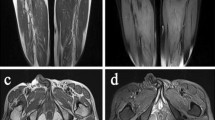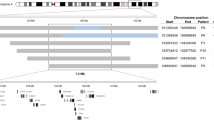Abstract
The major cause of lipid storage myopathies (LSM) in China is multiple acyl-CoA dehydrogenase deficiency (MADD) caused by ETFDH mutations. We here present an analysis of the spectrum of ETFDH mutations in the largest cohort of patients with MADD (90 unrelated patients). We identified 61 ETFDH mutations, including 31 novel mutations, which were widely distributed within the coding sequence. Three frequent mutations were identified: c.250G > A (most common in South China), c.770A > G and c.1227A > C (most common in both South and North China). Regional differences of allele frequency and further haplotype analysis suggest the possibility of founder effects of c.250G > A and c.770A > G. These findings promise to provide the basis for implementing a rapid and economical strategy for diagnosing MADD.

Similar content being viewed by others
References
Amigo J, Salas A, Phillips C (2011) ENGINES: exploring single nucleotide variation in entire human genomes. BMC Bioinforma 12:105
Barrett JC, Fry B, Maller J et al (2005) Haploview: analysis and visualization of LD and haplotype maps. Bioinformatics 21:263–265
Burr ML, Roos JC, Ostör AJ (2008) Metabolic myopathies: a guide and update for clinicians. Curr Opin Rheumatol 20:639–647
Er TK, Liang WC, Chang JG et al (2010) High resolution melting analysis facilitates mutation screening of ETFDH gene: applications in riboflavin-responsive multiple acyl-CoA dehydrogenase deficiency. Clin Chim Acta 411:690–699
Er TK, Chen CC, Liu YY et al (2011) Computational analysis of a novel mutation in ETFDH gene highlights its long-range effects on the FAD-binding motif. BMC Struct Biol 11:43
Frerman FE, Goodman SI (1985) Deficiency of electron transfer flavoprotein or electron transfer flavoprotein:ubiquinone oxidoreductase in glutaric acidemia type II fibroblasts. Proc Natl Acad Sci U S A 82:4517–4520
Goodman SI, Binard RJ, Woontner MR et al (2002) Glutaric acidemia type II: gene structure and mutations of the electron transfer flavoprotein:ubiquinone oxidoreductase (ETF:QO) gene. Mol Genet Metab 77:86–90
Henriques BJ, Rodrigues JV, Olsen RK et al (2009) Role of Flavinylation in a Mild Variant of Multiple Acyl-CoA Dehydrogenation Deficiency A molecular rationale for the effects of riboflavin. J Biol Chem 284:4222–4229
Higgins CL, Muralidhara BK, Wittung-Stafshede P (2005) How do cofactors modulate protein folding? Protein Pept Lett 12:165–170
Kimura M, Yoon HR, Wasant P et al (2002) A sensitive and simplified method to analyze free fatty acids in children with mitochondrial beta oxidation disorders using gas chromatography/mass spectrometry and dried blood spots. Clin Chim Acta 316:117–121
Lan MY, Fu MH, Liu YF et al (2010) High frequency of ETFDH c.250G > A mutation in Taiwanese patients with late-onset lipid storage myopathy. Clin Genet 78:565–569
Law LK, Tang NL, Hui J et al (2009) Novel mutations in ETFDH gene in Chinese patients with riboflavin-responsive multiple acyl-CoA dehydrogenase deficiency. Clin Chim Acta 404:95–99
Liang WC, Ohkuma A, Hayashi YK et al (2009) ETFDH mutations, CoQ10 levels, and respiratory chain activities in patients with riboflavin-responsive multiple acyl-CoA dehydrogenase deficiency. Neuromuscul Disord 19:212–216
Muralidhara BK, Rathinakumar R, Wittung-Stafshede P (2006) Folding of Desulfovibrio desulfuricans flavodoxin is accelerated by cofactor fly-casting. Arch Biochem Biophys 451:51–58
Ohkuma A, Noguchi S, Sugie H et al (2009) Clinical and genetic analysis of lipid storage myopathies. Muscle Nerve 39:333–342
Olsen RK, Andresen BS, Christensen E et al (2003) Clear relationship between ETF/ETFDH genotype and phenotype in patients with multiple acyl-CoA dehydrogenation deficiency. Hum Mutat 22:12–23
Olsen RK, Pourfarzam M, Morris AA et al (2004) Lipid-storage myopathy and respiratory insufficiency due to ETFQO mutations in a patient with late-onset multiple acyl-CoA dehydrogenation deficiency. J Inherit Metab Dis 27:671–678
Olsen RK, Olpin SE, Andresen BS et al (2007) ETFDH mutations as a major cause of riboflavin-responsive multiple acyl-CoA dehydrogenation deficiency. Brain 130:2045–2054
Schiff M, Froissart R, Olsen RK et al (2006) Electron transfer flavoprotein deficiency: functional and molecular aspects. Mol Genet Metab 88:153–158
Stephens M, Smith NJ, Donnelly P (2001) A new statistical method for haplotype reconstruction from population data. Am J Hum Genet 68:978–989
Wang Y, Zhao DH, Hong DJ et al (2011a) The hot spot mutations in ETFDH gene of riboflavin responsive lipid storage myopathy in 20 Chinese families. Chin J Neurol (Chinese) 44:309–313
Wang ZQ, Chen XJ, Murong SX et al (2011b) Molecular analysis of 51 unrelated pedigrees with late-onset multiple acyl-CoA dehydrogenation deficiency in southern China confirmed the most common ETFDH mutation and high carrier frequency of c.250G > A. J Mol Med 89:569–576
Wasant P, Kuptanon C, Vattanavicharn N et al (2010) Glutaric aciduria type 2, late onset type in Thai siblings with myopathy. Pediatr Neurol 43:279–82
Watmough NJ, Frerman FE (2010) The electron transfer flavoprotein: ubiquinone oxidoreductases. Biochim Biophys Acta 1797:1910–1916
Wen B, Dai T, Li W et al (2010) Riboflavin responsive lipid storage myopathy caused by ETFDH gene mutations. J Neurol Neurosurg Psychiatry 81:231–236
Yotsumoto Y, Hasegawa Y, Fukuda S et al (2008) Clinical and molecular investigations of Japanese cases of glutaric acidemia type 2. Mol Genet Metab 94:61–67
Acknowledgments
We thank all the patients for their contributions and Dr. Wang Haijian from the School of Life Sciences & Institutes of Biomedical Sciences, Fudan University for assistance with haplotype analysis.
Conflict of interest
None.
Funding
This work was supported by the National Natural Science Foundation of China [30970993 and 81171182].
Author information
Authors and Affiliations
Corresponding authors
Additional information
Communicated by: Georg Hoffmann
Jianying Xi and Bing Wen contributed equally to this work.
Electronic supplementary material
Below is the link to the electronic supplementary material.
ESM 1
(DOC 177 kb)
Rights and permissions
About this article
Cite this article
Xi, J., Wen, B., Lin, J. et al. Clinical features and ETFDH mutation spectrum in a cohort of 90 Chinese patients with late-onset multiple acyl-CoA dehydrogenase deficiency. J Inherit Metab Dis 37, 399–404 (2014). https://doi.org/10.1007/s10545-013-9671-6
Received:
Revised:
Accepted:
Published:
Issue Date:
DOI: https://doi.org/10.1007/s10545-013-9671-6




